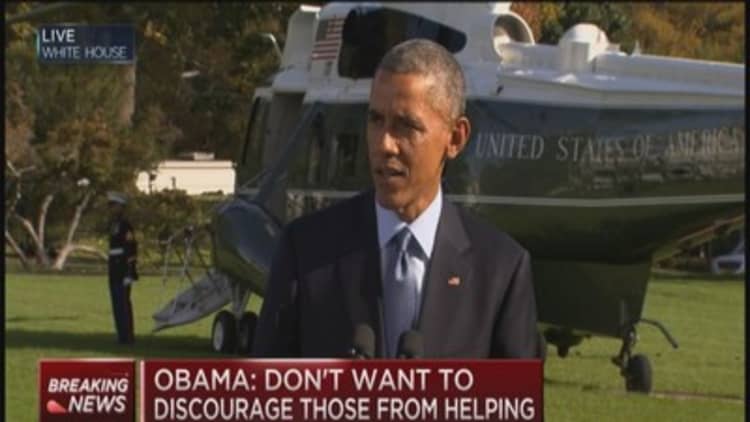The fight over Ebola quarantines in the United States is already discouraging doctors, nurses and other health workers from signing up to go to Africa and battle the outbreak where help is needed most.
Would-be volunteers are worried about losing three additional weeks of work when they return to the United States, about still-evolving isolation rules and about being holed up in an unfamiliar place, aid organizations say.
They also worry about mistreatment generated by the public fear of Ebola, the organizations say.
"We have seen a big deterrence," said Margaret Aguirre, head of global initiatives for International Medical Corps, which has about 20 Americans working in the outbreak countries. "People are worried. They don't want to sign up."
Read more from NBC News:
Maine Nurse Kaci Hickox Ordered to Stay Three Feet Away From People
Ambassador Power: 'Strictest Protocols' on Ebola Must Be Followed
Dublin Flight Held Over Passenger's 'Be Careful, Ebola' Note

The debate began in earnest last week, when governors of some states went further than federal health officials and ordered three-week quarantines for health workers returning from West Africa.
The epicenter of the controversy is a modest house in Fort Kent, Maine, where a nurse, Kaci Hickox, is defying demands from Gov. Paul LePage that she severely restrict her travel, even though she has said that she tested negative for Ebola and is symptom-free.
It's not just a matter of inconvenience for the health workers volunteering for duty in Africa. Liberia, Sierra Leone and Guinea, the hardest-hit countries, need 5,000 more people to fight the epidemic, the World Bank said this week.
And health officials stress that if the virus is allowed to rage further over there, where almost thousands of Ebola victims have already died, it increases the likelihood that additional cases will show up in the United States.
Read More Obama pushes against mandatory Ebola quarantines
At International Medical Corps, 18 to 20 of the 110 volunteers who had pledged to go to Africa are now rethinking their plans, said Rabih Torbay, the organization's senior vice president for international operations.
The organization asks for six weeks of volunteers' time—two for training and four for deployment. Quarantines raise the prospect of three more weeks away from their regular jobs at hospitals, practices and universities, and from their families.
In addition, despite pleas that returning health workers be treated as heroes, authorities have expressed concern about mistreatment and stigma. A Maine police chief has even mentioned death threats on social media against the nurse there.
"They don't want to lose patients," Torbay said. "They don't want to lose their jobs."
Read More Mobius unfazed by IMF growth cuts, eyes Ebola
There is little he can do to address those concerns. And there are no guarantees about what the rules will be two months from now. If further Ebola cases are detected in the United States, more states could tighten restrictions on returning doctors and nurses.
"It's definitely emotionally hindering people," said George Salloum, vice president of finance and operations for SIM USA, a Christian aid organization that has rotated workers into and out of the Ebola countries.
So far, he said, no one has reversed a decision to go. But volunteers, from doctors and nurses to the construction workers who are helping build Ebola treatment units, are concerned about how the climate in the United States may change.
"Hopefully smarter minds will come to the front," he said.

Federal health officials have outlined four categories of risk for returning health workers. It recommends blanket travel restrictions only for those at the highest risk, such as someone who handles body fluids without proper protective equipment.
Read MoreConsumers hunkered down during Dallas Ebola scare
But states are free to go further. New Jersey, New York and others have enacted tougher restrictions. Those have been criticized by health organizations as lacking a foundation in science.
And some aid organizations go further on their own. Samaritan's Purse, another missionary group, requires 21 days of restricted public access and avoiding public transit and large crowds.
Some organizations, such as Americares, say it's too early to tell whether the quarantine debate will hurt recruitment. The International Rescue Committee and Save the Children both pointed out that it makes a complex decision even more difficult.
"These kinds of restrictions could dissuade hundreds, if not thousands, of skilled volunteers from helping stop Ebola's spread," Samantha Power, the U.S. ambassador to the United Nations, said Thursday in Brussels.
"These volunteers are heroes to the people they help, and they are heroes to our own countries," she said. "They should be treated like heroes when they return."
--NBC News researcher Nikita Japra contributed to this report.

